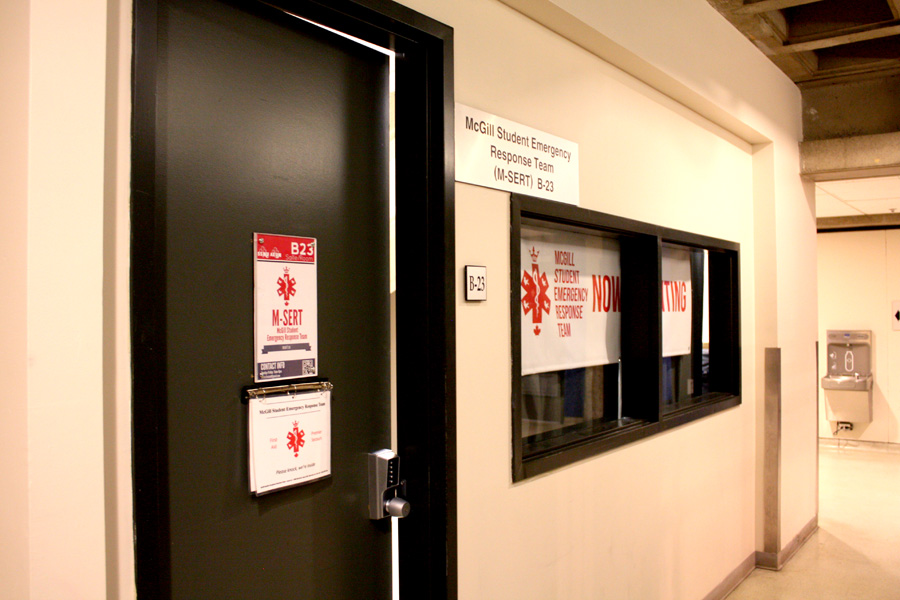Although frosh has come to an end, the consequences of frivolous alcohol consumption are an ongoing reality for many university students. Often the responsibility of caring for a queasy companion falls on a friend or a residence floor-mate.
During this year’s frosh and Orientation Week, the McGill Student Emergency Response Team (M-SERT) acted as the primary first-aid coverage for the week’s events. A group comprised of student volunteers who are all certified first responders, M-SERT treats emergencies from muscular-skeletal injuries to anaphylaxis, but the majority of their calls pertain to alcohol and drug-related problems.
M-SERT’s chief objective during this year’s frosh was to get out the message that as soon as an individual recognizes an emergency situation, one should call for help rather than try to handle the situation themselves. Students should call M-SERT if it occured at a McGill event or in residence, and an ambulance if it’s elsewhere.
“In the past, we had issues where coordinators and frosh leaders were in the way of the call and trying to [give treatment] themselves,” Director of M-SERT Thomas Schamhart says. “Legally, [if you’re giving any form of first aid, as a responder] you’re completely liable for anything that happens if you’re neglectful and drinking alcohol.”
As a preventative measure to stay safe, students should be prepared and know in advance where they’re going, with whom they’re going out, and how they’re getting home. Schamhart’s advice is simple: “Never be alone; you need someone to recognize that you are [in] a first-aid emergency.” In cases where you do find yourself alone, Schamhart recommends McGill’s Walk Safe and Drive Safe services, which facilitate safe travel at night.
If you’re in a situation where you think a friend has had a few too many drinks, the number one thing to remember is communication. The first step is to assess their level of consciousness—is the person alert and responsive to voice, to pain, or not responsive at all?
“Ask them: do they know where they are; do they know their name; do they know what day it is? If [someone] can’t answer those questions, that’s a bad sign,” Schamhart explains.
For this reason, checking in and re-evaluating your friend’s state is crucial. If you’re familiar with a friend’s reaction to alcohol, it may be easier for you to determine whether this is actually a cause for concern or not. For a person you are less familiar with, communication is even more important.
Asking an individual if they want an ambulance is one way of evaluating the situation. “People kind of forget [that] it’s a good question to ask, even if it’s your friend,” Schamhart explains. “It also saves you from making the decisions. They’re the one making the decisions. They’re the one [ultimately] going to the hospital.”
Also look out for and inquire about other potential injuries. You should ask questions like “Did you fall?” and “Did you hit your head on the counter?” says Yassmin Behzadian, M-SERT vice-president training. “Head injuries are very serious, it’s almost immediately 911.” The same goes for vomiting up anything abnormal, like blood, she added.
When a friend just needs to turn in for the night, there are other ways you can help out. You may want to get a blanket or sweatshirt, because alcohol depresses activity in some areas of the brain, thereby dulling the senses, and your friend may not realize how cold they are. Consuming alcohol also causes dehydration, which may be compounded if a person is vomiting. Giving a friend a glass of water will help re-hydrate them and reduce symptoms like headaches, muscle cramps, and dizziness.
Once your friend is in bed, try to check on them once in a while to make sure they’re okay, and that they haven’t rolled over into a weird position or vomited in their sleep.
The M-SERT staff stress that students should not hesitate to seek help, whether it is from a sober roommate, floor fellow, M-SERT, poison control (mainly in the case of drug use), or 911. According to Schamhart, people are often deterred by the potential repercussions of being caught using substances.
“Do not be afraid of the consequences, as keeping your friend healthy is the most important choice you can make,” Schamhart advises. If you’re not in a condition where you can provide that care, it’s your responsibility to find someone who can.
M-SERT’s office is located in room B23 in the SSMU Building. A team is situated in Molson and La Citadelle Residences every evening from 6p.m.- 6a.m. They can be reached by contacting McGill Security Services at (514) 398-3000. Office telephone: (514) 398-5216.









